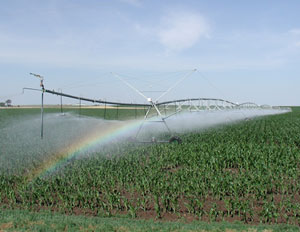Water usage for ethanol production varies dramatically depending on the state, according to a new University of Minnesota study.
 The study, published in this week’s edition of the journal Environmental Science and Technology, is the first to compare water use in corn-ethanol production on a state-by-state basis. The authors used agricultural and geologic data from 2006-2008 to develop a ratio showing how much irrigated water was used to grow and harvest the corn and to process it at ethanol plants.
The study, published in this week’s edition of the journal Environmental Science and Technology, is the first to compare water use in corn-ethanol production on a state-by-state basis. The authors used agricultural and geologic data from 2006-2008 to develop a ratio showing how much irrigated water was used to grow and harvest the corn and to process it at ethanol plants.
Among the major ethanol-producing states, Iowa uses the least water, with about six gallons of water used for each gallon of ethanol. On the other end of the spectrum, California – which produces only a tiny fraction of the nation’s ethanol but irrigates most of its corn – uses about 2,100 gallons of water per gallon of ethanol.
The study “highlights the need to strategically promote ethanol development in states with lower irrigation rates and less groundwater use,” the authors say. The study was funded in part by the U.S. Department of Energy and by the Legislative Citizens Commission on Minnesota Resources.


 The need for renewable fuels to replace fossil fuels is becoming more and more of a global necessity.
The need for renewable fuels to replace fossil fuels is becoming more and more of a global necessity.  Carbon dioxide has become an enemy of the Earth for its role in contributing to global climate change. One man wants to stop this unfair protrayal of “our friend carbon”. Dr. Norman Airs, the executive director of
Carbon dioxide has become an enemy of the Earth for its role in contributing to global climate change. One man wants to stop this unfair protrayal of “our friend carbon”. Dr. Norman Airs, the executive director of  As so many ethanol plants have closed in recent months, invester-owned ethanol start-up One Earth Energy LLC is planning to begin production on June 11, 2009. The 100 million gallon plant is located near Gibson City, Illinois.
As so many ethanol plants have closed in recent months, invester-owned ethanol start-up One Earth Energy LLC is planning to begin production on June 11, 2009. The 100 million gallon plant is located near Gibson City, Illinois.
 The State of Iowa is making a major investment to grow algae for biofuel at a southwest Iowa ethanol plant.
The State of Iowa is making a major investment to grow algae for biofuel at a southwest Iowa ethanol plant. A Longview, Texas-based maker of terminal tractors has introduced a hybrid electric version of the vehicle.
A Longview, Texas-based maker of terminal tractors has introduced a hybrid electric version of the vehicle. Although the ethanol plant said it needed $10 million to stay in business just four months ago, Show Me Ethanol in Carrollton, Mo. has reached a loan agreement and will afloat after raising $5.9 million from shareholders.
Although the ethanol plant said it needed $10 million to stay in business just four months ago, Show Me Ethanol in Carrollton, Mo. has reached a loan agreement and will afloat after raising $5.9 million from shareholders.  The University of Georgia will soon be collaborating with
The University of Georgia will soon be collaborating with  “This project allows us to expand our internal and collaborative plant breeding activities in a region where we believe the industry will have a strong presence,” said Ceres plant breeding director Jeff Gwyn, Ph.D. “There’s a lot of headroom for improvement and I’m confident that working together we can continue to drive up yields at a robust pace,” he said.
“This project allows us to expand our internal and collaborative plant breeding activities in a region where we believe the industry will have a strong presence,” said Ceres plant breeding director Jeff Gwyn, Ph.D. “There’s a lot of headroom for improvement and I’m confident that working together we can continue to drive up yields at a robust pace,” he said. 